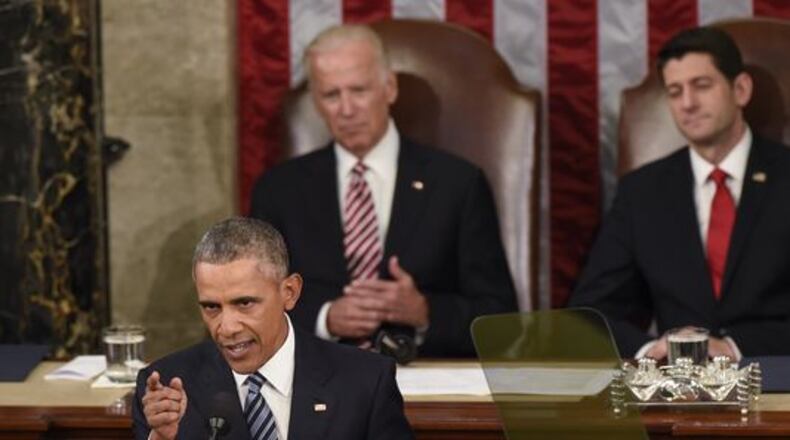In his final State of the Union address last night, President Obama cautioned his fellow Americans against would-be leaders who want to respond to the rest of the world with only "tough talk or calls to carpet-bomb civilians," who seek to gain political advantage by exaggerating the threats against us and by instilling fear rather than confidence in the American people.
"That’s not leadership; that’s a recipe for quagmire, spilling American blood and treasure that ultimately will weaken us," Obama warned. "It’s the lesson of Vietnam. It’s the lesson of Iraq, and we should have learned it by now."
As it happens, fate had arranged a little real-life demonstration of Obama's point, playing out even as he spoke. A few hours earlier, two American patrol boats operating in the Persian Gulf had drifted more than a mile into Iranian territorial waters, where they had naturally been picked up by Iranian authorities. Apparently at least one of the boats had suffered some sort of mechanical breakdown. The boats and their 10 crew members were then taken to a nearby Iranian military base while people figured out what had happened and how they could be returned.
From the very beginning, that was the approach taken by both Iranian and American authorities. Both parties were willing to accept the innocent intent of the other until proved otherwise. But the response from top conservatives was quite different.
Marco Rubio called the Iranian action "provocative, absolutely," concluding that "You're only going to see a continued pattern of provocation, as long as a weak president like Barack Obama is in the White House."
"If our sailors aren't coming home yet, they need to be now," Jeb Bush said. "No more bargaining. Obama's humiliatingly weak Iran policy is exposed again."
U.S. Sen. Tom Cotton called it "an openly hostile action" by Iran, which of course implies the need for an openly hostile response by the United States. And Ted Cruz called it "the latest manifestation of the weakness of Barack Obama," complaining that "our enemies don't fear us."
Yet as dawn broke over the Persian Gulf a few hours after Obama's speech, the two U.S. Navy vessels with all 10 American sailors safely aboard were released into international waters. Just like that, it was over. A little incident that some had tried to exaggerate into something major -- a "provocation", "an openly hostile action" -- had been resolved calmly, swiftly and civilly. The only people who ended up embarrassed in the situation were those who had rushed immediately to judgment, demanding an aggressive U.S. response that might have touched off an equally aggressive response by the Iranians.
And let's put this into historic context. Obama didn't buy back our sailors with secret shipments of missiles and other weapons, as President Reagan did in attempting to recover Americans held hostage by the Iranians a generation ago. Our sailors weren't held for almost two weeks by the Iranians, with their ships dismantled and held hostage until what amounted to a ransom was paid, as occurred in an incident involving the Chinese and an American spy plane under President George W. Bush.
Instead, they were released promptly and respectfully. If this outcome is "just an indication of where the hell we're going," as Donald Trump angrily described it, then we seem to be going to a somewhat more sane and thoughtful approach to international relations.
But hey, with an election looming, that could change. If you prefer a knee-jerk, angry response from leaders who rush to judgment and can't be bothered to wait even a few hours to see how things work out, you will clearly have a chance to vote for such a candidate.
About the Author
The Latest
Featured



